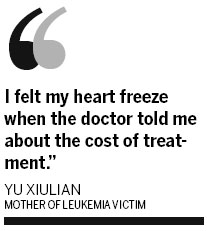Top Biz News
Poor helped by reform of the healthcare system
(China Daily)
Updated: 2010-03-15 13:15
 |
Large Medium Small |
Yu Xiulian is a farmer in Molou village, near the city of Zhongwei in the northwestern Ningxia Hui autonomous region. Her daughter was diagnosed with leukemia in June, 2009.
Yu's family paid 60,000 yuan ($8,780) in less than one year to save daughter's life, a huge sum of money for a family of four living on a monthly income of 1,600 yuan.
"I felt my heart freeze when the doctor told me about the cost of treatment," she said.
Fortunately, her daughter received medical assistance that covered 70 percent of the out-of-pocket payment (42,000 yuan). Thirty percent of the total cost (18,000 yuan) was reimbursed thanks to the new rural corporative medical care system (NCMS).
So at the end of the day, they paid 12,600 yuan. Yu said, "Without the medical assistance, I might have to give up my daughter's life."
The city of Zhongwei began offering medical assistance in both cities and the countryside in 2008, pooling provincial and city-level fiscal investment, donations from the private sector and individuals.
It is provided to financially challenge urban and rural residents who are afflicted by 10 serious diseases, such as tumors, uremia and severe hepatic diseases.
According to Zhongwei's policy, the reimbursement rate is linked to the out-of-pocket fee for inpatient medical services.
If the one-year medical cost falls in the bracket of 30,000 to 50,000 yuan, the rate is 60 percent. In the 50,000 to 100,000 yuan bracket, it is 70 percent. Any higher and it is 80 percent.
Those who need medical assistance need to file applications that are subject to approval by a board composed of civil affairs officials, health experts, local legislators and other public servants.

The medical assistance scheme is carried out across China, reimbursing patients' out-of-pocket fees for inpatient and outpatient medical services, relieving the financial burden on low income groups.
Specific policies may vary according to the financial strength of different localities.
Yang Lixiong, a Renmin University professor specializing in social security, said health security plays the most important role in making lives easier for low income groups.
"Otherwise, if one gets severe disease, an entire family could be dragged below the poverty line," said Yang.
In China, health security, or a health safety net, mainly consists of health insurance and medical assistance, and medical care for civil servants and employees of public institutions.
China now has a health safety net in place covering both urban and rural areas. Over the years, it prevented a lot of disease-afflicted families from sliding into acute poverty.
However, expensive health care still poses a grave social concern. In the lead up to the ongoing annual parliamentary and political advisory sessions, many Chinese voiced their complaints online. According to statistics, medical care was among the top three concerns.
Prof Yang pointed out several drawbacks to the current health safety net.
Among other things, Yang said the reimbursement rate of the new rural corporative medical care system (NCMS) was too low to guard farmers against poverty.
At present, farmers pay 20 yuan a year to join NCMS, while the government pays 80 yuan for each member.
According to such fund-pooling levels, the reimbursement rate is usually around 30 percent, said Yang.
The low reimbursement rate has made NCMS less attractive. Grass-root health officials have to talk farmers into joining the scheme by a knock-on-door approach.
According to the Ministry of Health, 833 million farmers had joined NCMS by the end of 2009, 94 percent of the rural population.
For urban employees and unemployed residents, the net looks not so safe either, because the reimbursement rate has a ceiling. If medical costs exceeds that ceiling, one has to pay oneself or apply for medical assistance.
| ||||
This was addressed in Chinese Premier Wen Jiabao's Report on the Work of the Government earlier.
Wen said this year the government's payment would increase from 80 to 120 yuan for each member, a 50 percent rise.
Wen said, pilot projects would be carried out to offer additional health security to rural children suffering leukemia and congenital heart disease.
"We will provide greater help to these unfortunate children and their families," vowed Wen.
Professor Yang also called for closing the existing gaps between several schemes tailored to different social groups.
Xinhua













